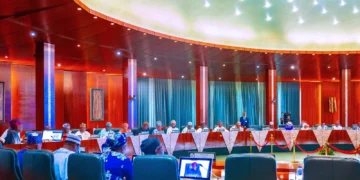Subsidy removal has been about the only advise Nigerian authorities have effectively resisted from multilateral financial institutions for over three decades. But having taken the plunge this time, many citizens of Africa’s biggest economy are quite ready and willing to yield ground and make what is largely considered a sacrifice.
They would probably be even more cooperative if the political leadership weren’t living larger than Arabian princes and flaunting an outrageous ostentation in the midst of so much want and deprivation. The grouse is really that the government expects of citizens living on the marginal fringe to make sacrifices which the political elite are not prepared to make, or feel any obligation towards.
But everyone – leaders inclusive, needs to make a sacrifice. Workers need a pay raise and political office holders need drastic pay cuts in other to attain something close to equity, if not equilibrium.
That, at least, is a moral justification; a good place to start. Wage cuts for the political class across all cadres, is something not a few think the new Tinubu administration – with progressive inclinations, should be decisive about. It’s also a good bargain for the pro-subsidy crowd, and a good bargain for the labour unions.
While political office holders quickly become extremely rich, wage increases for workers are hardly implemented at state levels where officials cream off huge sums as “security votes”. Before upgrading the minimum wage to N30,000 in October 2019, most states had not even begun the implementation of the N18,000 approved since 2011.
States invariably, complain about consequential adjustments and cheekily plead “inability to pay”. The workers, with compromised union leaders and lacking a fighting front then live with the grudge of seeing the unproductive political elite climbing the social and economic ladder for practically doing nothing other than having access to public resources.
The point, though, is the expectation that leaders of poor countries ought to be humble and more prudent with public resources. But this is seldom the case. They are frequently the ones who jet off to Western capitals with pomp and flair to solicit aide. They are more adept at wrong precepts and thrive in them.
There are few statesmen emulating the inspiring and exemplary precedence that was JJ Rawlings of Ghana, Julius Nyerere of Tanzania, or Thomas Sankara of Burkina Faso. And how much Nigeria needs such exemplary characters at every level cannot be overemphasized. But there’s a very recent example, even if it’s far off Africa’s continental shelf:
From March 1st 2010 to March 1st 2015, Jose Mujica ruled the South American state of Uruguay. For all intents and purposes, Mujica had a far less profile and visibility than Luiz Suarez, his compatriot who plays football.
But this is not a comparison between a head of state and an athlete. After all few people on the street ever know that Alberto Fernandez is the name of the Argentine president, or that Marcelo Rebelo de Sousa is the name of the Portuguese president. But every school boy can tell tales about Lionel Messi of Cristiano Ronaldo.
Mujica became a folk hero as the ‘poorest’ president in the world. He had an austere lifestyle and donated 90% of his $12,000 monthly salary to charitable causes. Plus he shunned a luxurious state house to live, along with his wife, in a ramshackle farmhouse where they grew flowers – tilling the soil themselves.
This however, is not a proposition that living an austere life or donating to charity are evidence of good leadership. But it is a worthy reference where citizens are in search of heroes and where the rulers need to demonstrate sincerity of purpose and intention. It is also an illustration that with self-discipline and contentment, one can scrape the honey jar without licking one’s fingers.
Materially, Mujica couldn’t possibly compare with a supervisory councilor – not to mention a local government chairman, state or federal legislators, governors, anyone in the cabinet or presidency for that matter. – Long convoys of the most expensive vehicles money can buy, retinues of aides, every kind of imaginable benefits without taxes and at the expense of the state.
Conversely, Uruguay by per capita income and purchasing power parity, ranks 62nd in the list of world’s richest countries with 2022 inflation rate put at 9.10%, according to WorldData.info. Nigeria, arguably the richest country in Africa, ranked 142nd in the Legatum Prosperity Index with current inflation rate put at 22.04%.
The current economic situation where citizens in Africa’s richest country are paying what the government believes, is the full market value of petrol, therefore requires a sort of Mujica example on the part of the political elite.
It defies logic that a nation with a GDP per head of about $2,065 parades the highest paid legislators in the world whose outlandish accruals doesn’t come anywhere near their output in terms of legislative performance of oversights and other responsibilities.
In a few days, a new National Assembly will be inaugurated and it would constitute a slap on public sensibilities if they set off with the usual provisions for luxury cars, housing and others.
As he steps in fully into the affairs of state, it is expected that President Tinubu will take a long and comprehensive look at how the cost of governance over the years has denied Nigerians the dividends of good governance.
As with the subsidy issue, there’s no better time for the President to address the age-long grievance by ordinary folks about profligacy in government. There has to be a deliberate attempt to prune the cost of recurrent expenditure that frequently leaves capital provisions bare while the lavish consumption of the political elite is exorbitant and for no justifiable reason.
Perhaps what hurts even more, is that whatever is left for projects is again raided by the selfsame political class and their collaborators in the public service and the country is left broke and broken.
If this President spares a thought for the huge difference in income between elected leaders and the rest of society and takes positive action, he would have started on the right note. One hopes he does!
–Julius writes from Utako





